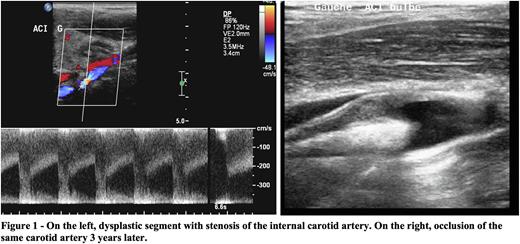Abstract
Introduction Stroke is one of the main causes of morbidity and mortality in sickle cell disease (SCD) patients, both children and adults. Most cases of stroke are ischemic and associated with a specific narrowing of large intracranial arteries called "SCD-vasculopathy". Cervical artery lesions were also reported as potentially responsible for strokes in children but very little is known in adults. We aimed to describe cervical artery lesions in SCD adults and assess the associated risk of stroke.
Design and Methods We included consecutive SCD adult patients referred to our hospital for a neurological assessment. Cervical arteries were analyzed using a standardized ultrasound Doppler protocol. Lesions were dichotomized as (i) segmental: dysplastic, atherosclerotic or sinuosity or (ii) non segmental (occlusion or near occlusion). Brain MRI was used to assess brain lesions.
Results Among 216 patients, a lesion of cervical arteries independent from an intracranial vasculopathy was present in 101 patients (47%, 95% CI : 40-53). Among those 101 patients, the lesion involved at least one carotid artery in 92 patients, at least one vertebral artery in 32, and both in 23. The were mainly segmental lesions : dysplastic lesion in 45/101, and sinuosities in 55/101. An occlusion or sub-occlusion of the carotid artery was identified in 6.
Among 81 patients with extracranial internal carotid lesions and no ipsilateral intracranial vasculopathy, 39 had brain lesions on MRI, which were territorial infarcts in 21. Five patients had an ischemic stroke during a 47 months follow-up including 2 due to the initial cervical artery lesion. One of them is illustrated in Figure 1.
Conclusion Cervical artery lesions are common in SCD patients. They may be responsible for cerebrovascular complications such as brain lesions and stroke. The need for a systematic screening and prevention strategy will have to be assessed.
Disclosures
Bartolucci:Bluebird bio: Consultancy, Research Funding; Emmaus: Consultancy, Research Funding; Fabre Foundation: Research Funding; Innovhem: Other: Co-founder; Hemanext Inc: Consultancy; JazzPharma: Consultancy; Global Blood Therapeutics: Consultancy, Research Funding; Novartis: Consultancy, Research Funding; Agios: Consultancy, Research Funding; Roche: Consultancy; Addmedica: Consultancy, Research Funding.
Author notes
Asterisk with author names denotes non-ASH members.


This feature is available to Subscribers Only
Sign In or Create an Account Close Modal